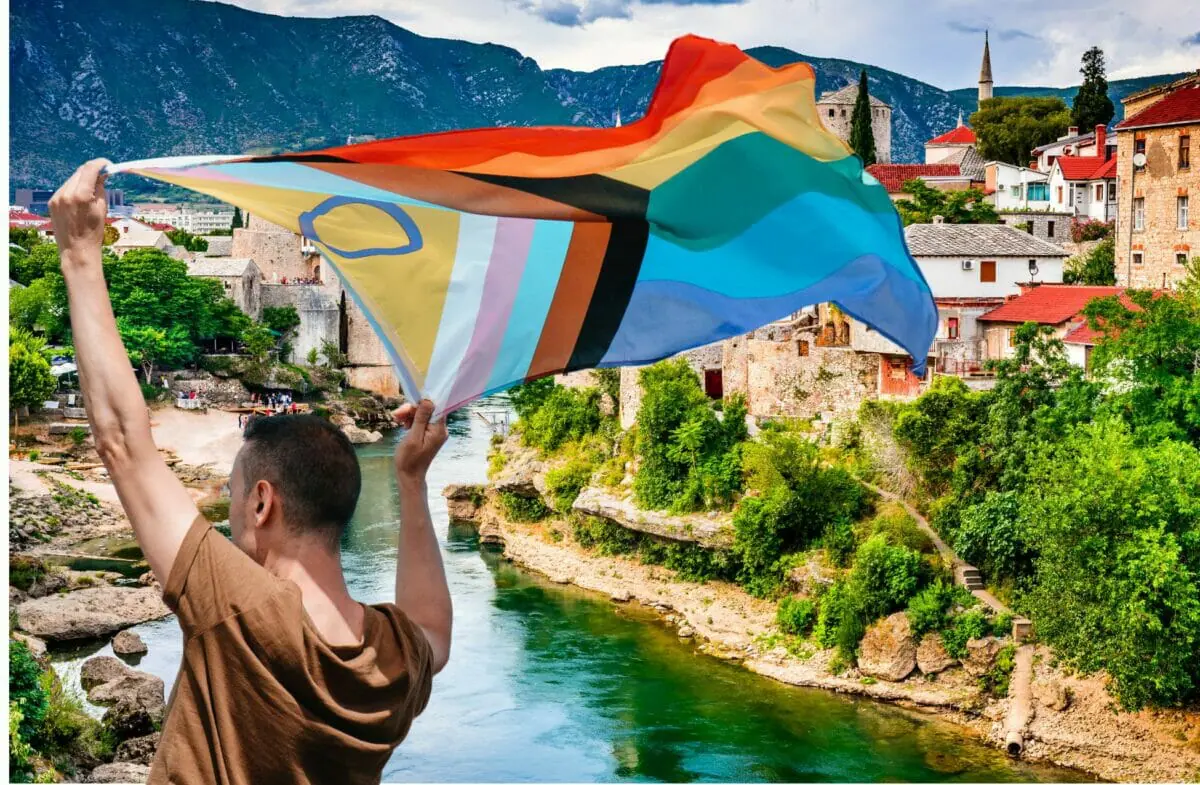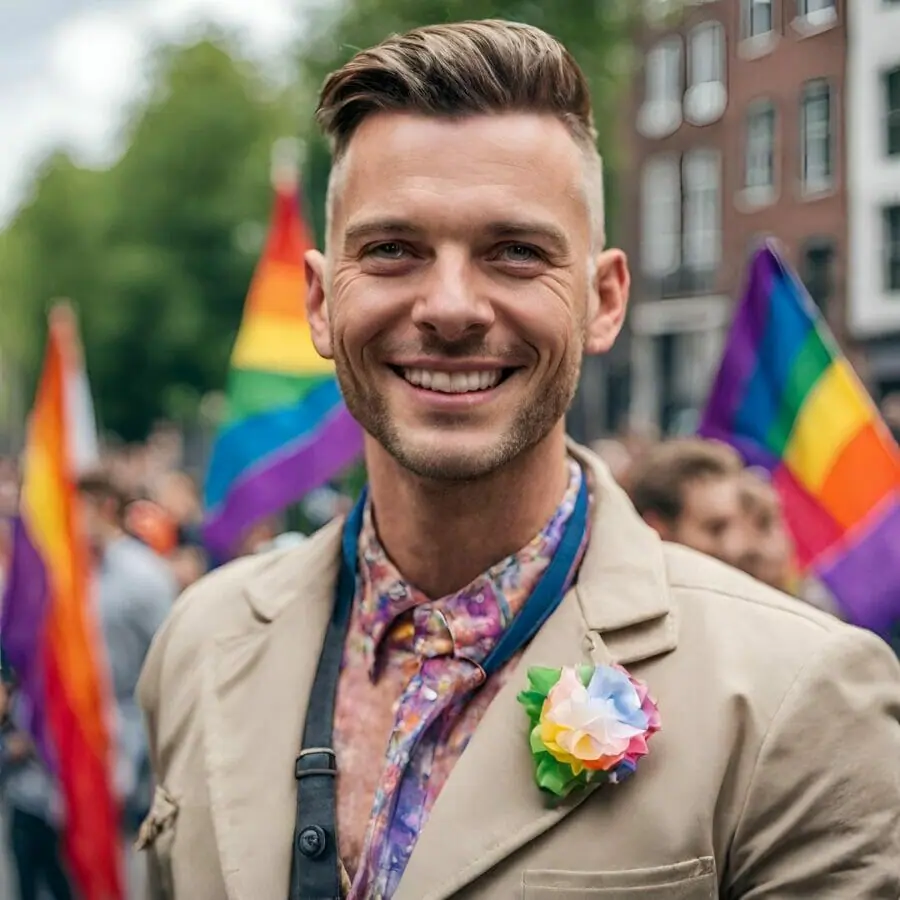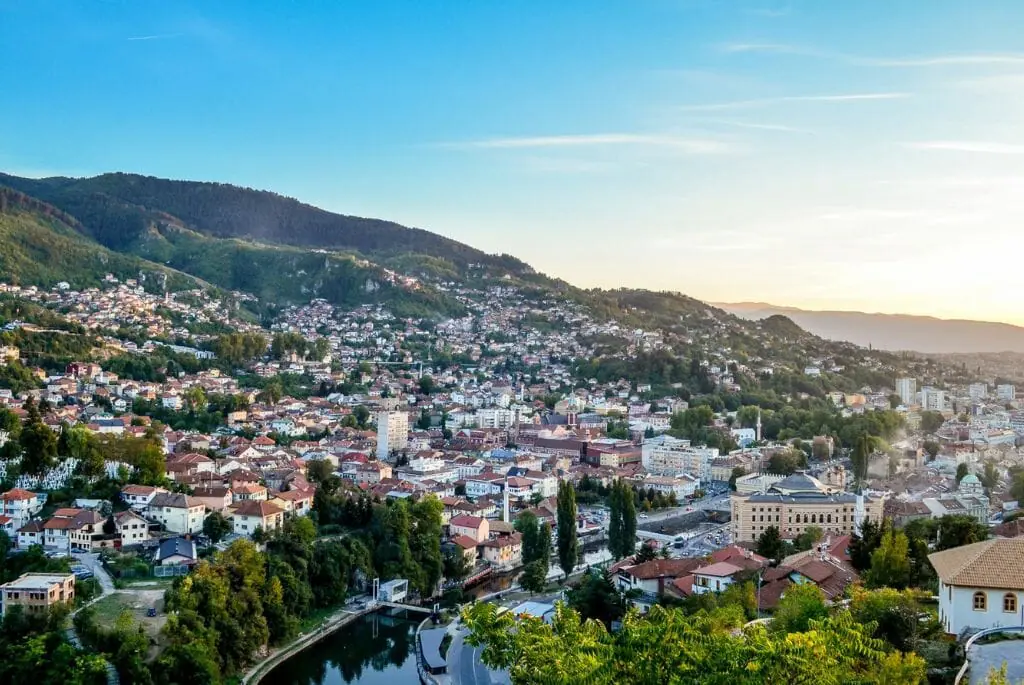In the intricate tapestry of Balkan nations, Gay Bosnia and Herzegovina stands out as a country of paradoxes. Steeped in rich history and natural beauty, the nation’s stance on LGBTQ+ rights remains conservative, reflecting its complex cultural and religious heritage.
Although homosexuality was decriminalized in the whole country by 1998, the societal acceptance of the LGBTQ+ community is still on a gradual journey, and the community often finds itself on the fringes of the broader Bosnian society.
Gay Bosnia and Herzegovina, much like its neighbors, is a nation where family ties and religious beliefs hold significant sway over public opinion. This conservative backdrop means that many queer individuals often lead dual lives: open and expressive in the safe confines of discreet queer spots and gatherings, yet cautious and reserved in their public and family spheres.
The capital city, Sarajevo, has a few LGBTQ+-friendly establishments, but they operate subtly, emphasizing discretion for the safety and comfort of their patrons.
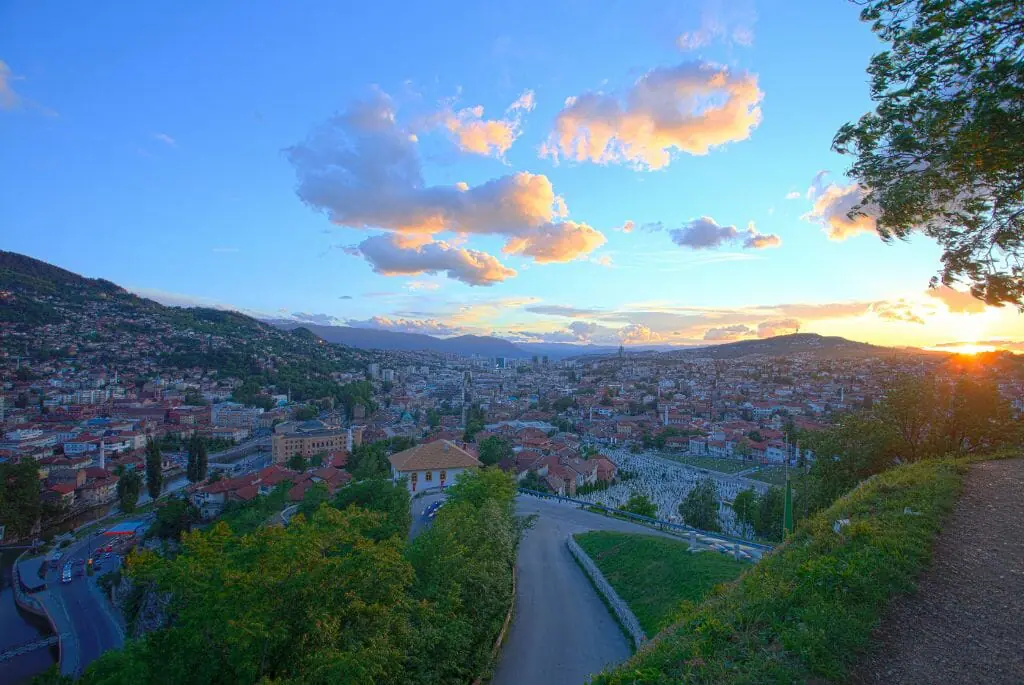
Yet, despite the societal challenges, Bosnia and Herzegovina’s LGBTQ+ activists and allies work tirelessly towards better rights and representation. Sarajevo saw its inaugural Pride Parade in 2019, a groundbreaking and brave move, paving the way for increased visibility and understanding of the community’s struggles. The event, met with both support and opposition was a testament to the changing tides, albeit slowly, in Gay Bosnia and Herzegovina.
For the informed LGBTQ+ traveler, Bosnia and Herzegovina offers unparalleled scenic beauty, from its azure rivers to historic Ottoman-era bazaars. Places like Mostar, with its iconic Stari Most bridge, offer cultural delights that provide an escape into the past.
While Gay Bosnia and Herzegovina may not yet be the LGBTQ+ haven some travelers seek, its blend of Eastern and Western influences, paired with its evolving queer narrative, makes it a destination worth exploring with an open heart and a prudent mindset.
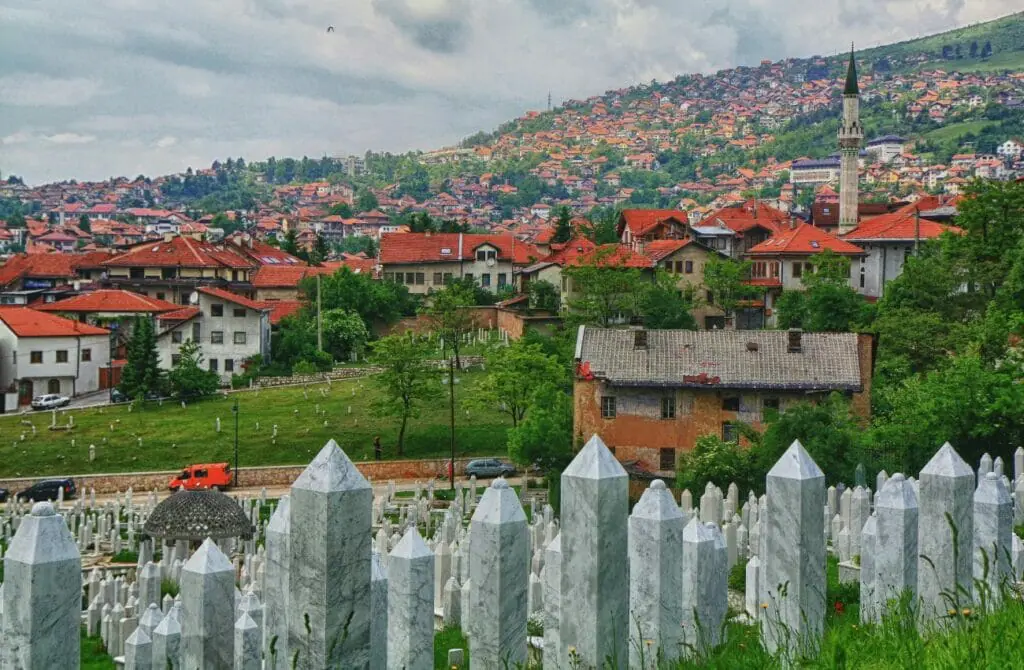
History Of LGBT Rights In Bosnia and Herzegovina
The journey of LGBT rights in Bosnia and Herzegovina has seen significant progress over the years. Same-sex sexual activity was first legalized in the Federation of Bosnia and Herzegovina in 1996 and in the Republika Srpska in 1998. The Brčko District also legalized homosexuality in 2003, making it legal nationwide since then.
Despite facing numerous challenges, the country held its first LGBT Pride in 2019, marking an important milestone in the fight for visibility and acceptance of the LGBT community. However, legal protections against discrimination based on sexual orientation and gender identity still have a long way to go. Gay marriage remains unrecognized, and changing one’s gender legally requires surgery.
When it comes to the experience of local LGBT individuals versus tourists, locals may face more significant challenges, particularly due to societal attitudes and lack of awareness. Tourists, while being at a lesser risk of discrimination, should remain cautious and respectful of local customs.
As a visiting LGBT individual, it’s essential to stay vigilant, respect the culture, and keep updated on the latest information regarding LGBT rights. Situations can change quickly, so seeking advice before traveling to Bosnia and Herzegovina is highly recommended.
Local LGBT advocacy groups, such as the Sarajevo Open Centre, play an essential role in promoting and protecting the rights of the LGBT community. These organizations can be a valuable resource for understanding the current landscape and obtaining up-to-date information on LGBT rights in the country.
It’s exciting to witness the progress made in Bosnia and Herzegovina regarding LGBT rights. By staying informed, respecting local customs, and supporting local LGBT advocacy organizations, we can all contribute to a brighter future for the LGBT community in this beautiful nation.
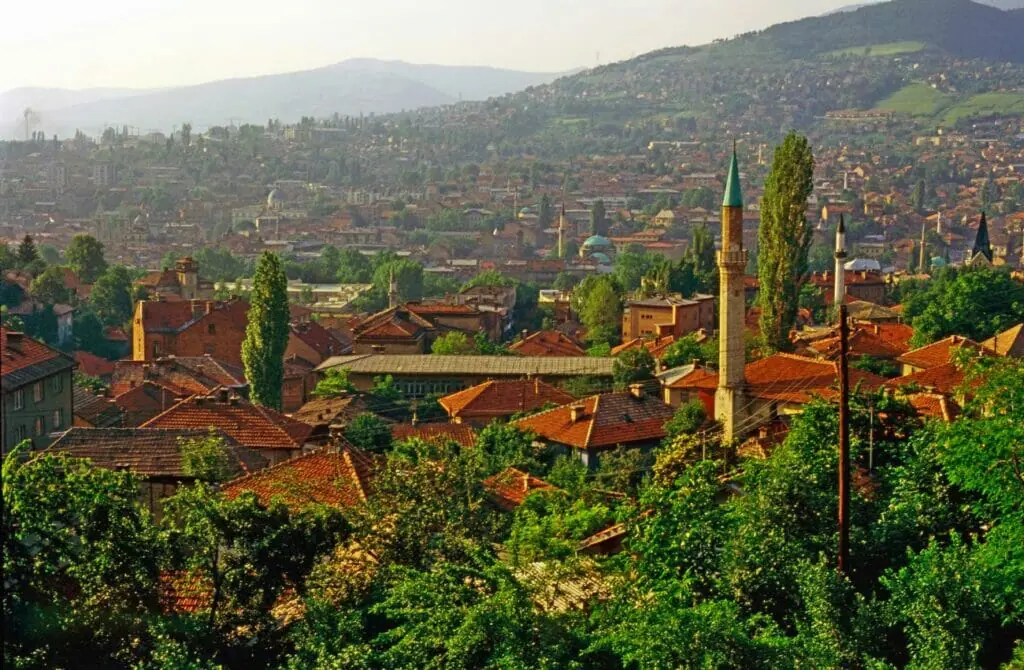
The LGBT Legal Situation In Bosnia and Herzegovina
Bosnia and Herzegovina has made progress in recent years about LGBT rights. Both male and female same-sex sexual activity are legal in the country. However, some disparities still exist as households headed by same-sex couples are not eligible for the same legal protections available to opposite-sex couples.
In 2019, the country saw a significant milestone in the form of its first-ever LGBT Pride event. This development highlights an increasing openness and acceptance towards the LGBT community, though more work remains to be done. Discrimination on the basis of sexual orientation and gender identity is illegal, and gender can be legally changed if the individual undergoes surgery.
For locals and tourists alike, it’s important to remain vigilant and aware of your surroundings, as some areas may be more conservative than others. While the legal situation is improving, societal attitudes may still pose challenges, and risks may vary depending on the region or context.
Make sure to stay informed about current developments and local attitudes towards LGBT rights. Situations can change quickly, so always seek up-to-date advice before traveling or engaging in activities. Reach out to LGBT advocacy groups to receive the most accurate information and resources on navigating the social landscape.
Some recognized organizations include Sarajevo Open Centre and CURE Foundation, both working to advance the rights and visibility of the LGBT community in Bosnia and Herzegovina. Their enthusiasm and dedication to this mission show the potential for continued progress in the region.
Remember, always stay cautious and be aware of your surroundings, as every country has its share of bad actors. Remain informed and connected to strong support networks to ensure a safe and enjoyable experience for all.
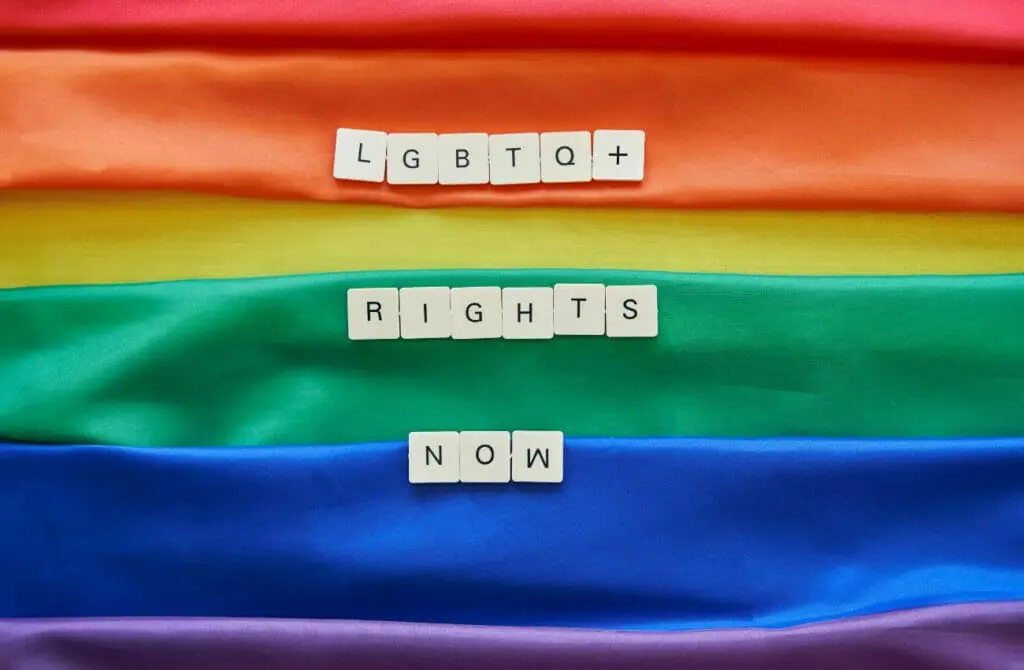
The LGBT Social Situation In Bosnia and Herzegovina
Despite significant strides in recent years, the social situation for LGBT individuals in Bosnia and Herzegovina remains challenging. Although both male and female same-sex sexual activity is legal, households headed by same-sex couples do not enjoy the same legal protections as those of opposite-sex couples.
Bosnia and Herzegovina’s first LGBT Pride in 2019 was a historic and exciting event, shining a positive light on the community. However, everyday life for LGBT individuals still runs up against a wall of prejudice, especially as this secular country is made up predominantly of Muslims and Christians.
For LGBT travelers visiting Bosnia and Herzegovina, understanding the local social situation is essential. Tourists may experience less direct discrimination, but it’s always wise to be vigilant and take precautions, as the situation can change quickly. Remember that there are inevitably bad actors in every country, and it’s crucial to remain aware of your surroundings and current events.
To protect yourself while visiting, consider connecting with local LGBT advocacy groups and doing thorough research on the places you plan to visit. Seeking current advice, especially from locals, can provide you with valuable on-the-ground knowledge and guidance.
Several organizations, such as the United Nations Development Programme (UNDP), are working to improve the lives of LGBT individuals in Bosnia and Herzegovina. As a result, the institutional, legal, and public policy framework for LGBT rights has seen significant improvements in recent years. Despite these efforts, the social situation remains on the fringe of the political, institutional, and mainstream society.
In conclusion, if you’re an LGBT traveler planning a trip to Bosnia and Herzegovina, it’s important to be informed about the social situation and to exercise caution. Equip yourself with the most current and accurate information, stay vigilant, and engage with local advocacy groups to ensure a safe and enjoyable visit.
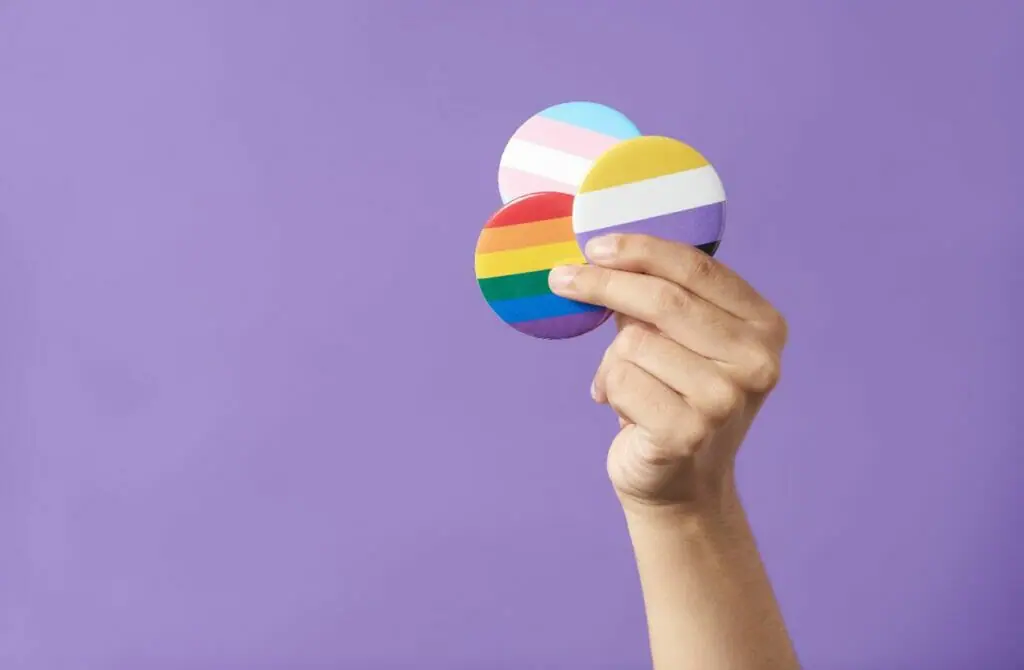
Trans Rights In Bosnia and Herzegovina
Bosnia and Herzegovina has seen progress in recent years in terms of LGBTQ+ rights. However, the situation for transgender individuals still has room for improvement. Transgender people are allowed to change their legal gender on official documents, but this process requires undergoing sex reassignment surgery. While this represents a step in the right direction, it leaves out non-binary individuals, as their gender identities are not legally recognized.
Due to societal conservatism and a lack of understanding, transgender individuals may face discrimination from both locals and authorities. Hence, it is important to stay cautious and vigilant when traveling or living in Bosnia and Herzegovina. Since the situation can change rapidly, always seek up-to-date information and advice before setting out on a voyage.
There are organizations and groups in Bosnia and Herzegovina that actively work towards promoting and protecting LGBTQ+ rights, such as “Sarajevo Open Centre” and “LGBTIQA+ Resource Center Tuzla.” These organizations provide support, resources, and advocacy for LGBTQ+ individuals, including transgender people. It is advisable to get in touch with these groups to remain informed on the current state of affairs and any changes that may impact the transgender community in the country.
In conclusion, while there have been some advancements in transgender rights in Bosnia and Herzegovina, there’s still much work to be done. Remember to stay cautious, well-informed, and connected with local LGBT advocacy groups to help ensure a positive experience while in the country.
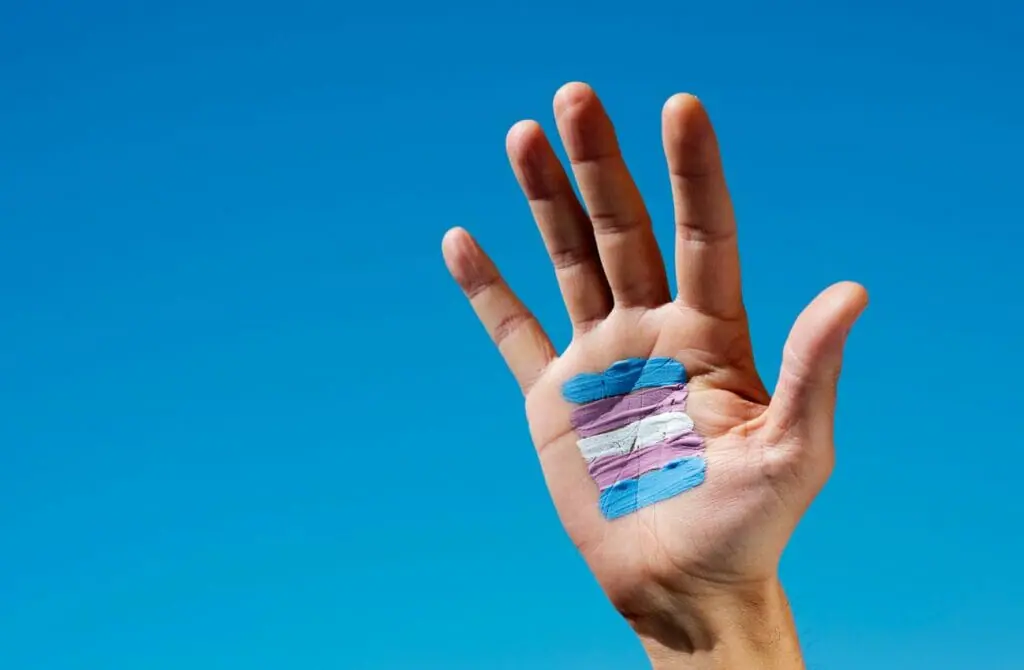

The Future For The Queer Community In Bosnia and Herzegovina
The future for LGBT rights in Bosnia and Herzegovina holds promise, as the country has made strides in improving the rights and freedoms of LGBT individuals. The first-ever LGBT Pride in 2019, for instance, marked a significant development in embracing and empowering the community.
This momentum continued with the adoption of the 2021-2024 Action Plan for the Promotion of Human Rights and Fundamental Freedoms of LGBTI People in Bosnia and Herzegovina. Enthusiasm abounds as the plan demonstrates the government’s commitment to bettering the lives of LGBT individuals and integrating their rights into mainstream politics.
However, it’s important to remember that, as in every country, there are always individuals who may not share these progressive views, and the situation can change rapidly. To protect yourself, it’s advisable to stay informed about the current situation and seek advice from relevant LGBT advocacy groups before traveling.
As a traveler, it’s essential to remain vigilant and to differentiate between the situations of locals and tourists in terms of legal rights and societal treatment. While there have been improvements in the legal framework, societal attitudes may still be at odds with this progress, particularly in smaller towns or rural areas.
To further protect LGBT rights in Bosnia and Herzegovina, you can show support for local advocacy groups working tirelessly to create a more inclusive and safe environment. These organizations work both on the frontline and behind the scenes to empower the community and elevate their voices, ensuring that progress continues in a positive direction.
In conclusion, being aware of the fast-paced changes in the country and staying up-to-date on relevant information can ensure a safer and more enjoyable experience as an LGBT tourist in Bosnia and Herzegovina. Embrace the excitement of the nation’s progress, but always remember to remain cautious and vigilant throughout your journey.
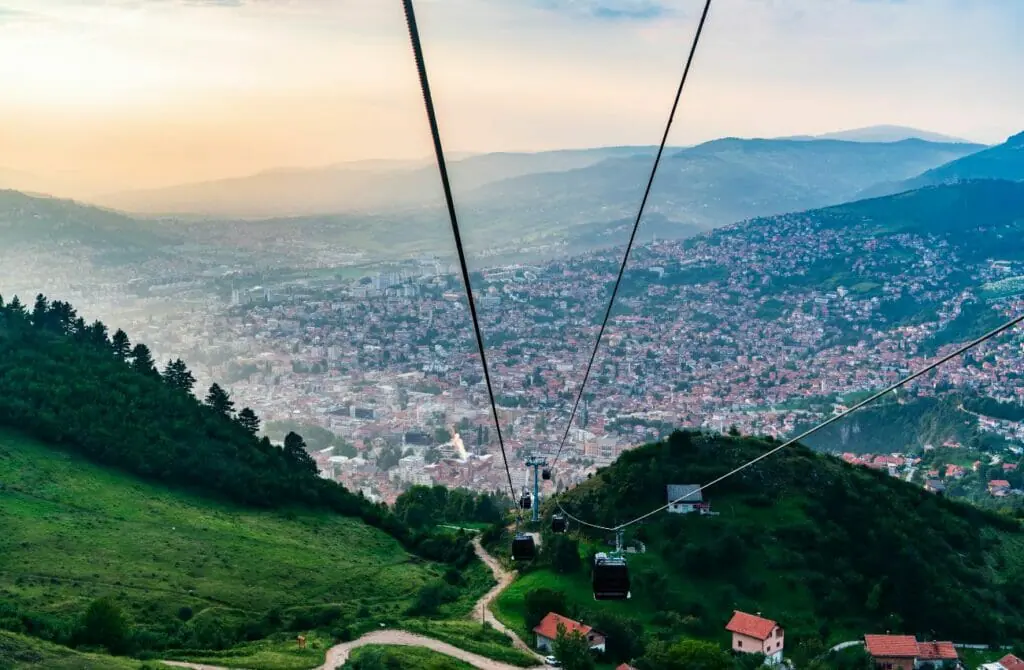
Protect Yourself While Travelling In Gay Bosnia and Herzegovina
Bosnia and Herzegovina has made significant strides in recent years concerning LGBT rights, and it is important to be aware of the protections and resources available for both locals and tourists. That being said, always remember that situations can change rapidly, and it is essential to remain vigilant and seek up-to-date advice for a safe and enjoyable experience.
In Bosnia and Herzegovina, the Law on Equality of Sexes has been in place since early 2003, prohibiting discrimination based on gender and sexual orientation. While it’s not without flaws, this legal framework offers a basis for the recognition and protection of LGBT rights in the country.
No matter if you’re a local or a tourist, keep in mind that regional and cultural differences can still persist, so you should always err on the side of caution. It’s essential to be respectful and aware of your surroundings and the customs of the area. Just like anywhere else in the world, bad actors exist, so stay vigilant and mindful of your safety.
One of the best ways to stay informed is to connect with LGBT advocacy groups operating in Bosnia and Herzegovina. These groups can provide valuable resources, advice, and support to help navigate the complexities of the current environment.
Remember, situations can evolve quickly, and information might become outdated. So before you travel or make plans, always ensure you’re seeking the most current advice from trustworthy sources or reliable organizations.
While progress has been made, there’s still much work to be done. Keep the excitement alive by supporting the cause and being a responsible, informed, and respectful representative of the LGBT community, both locally and as a traveler.
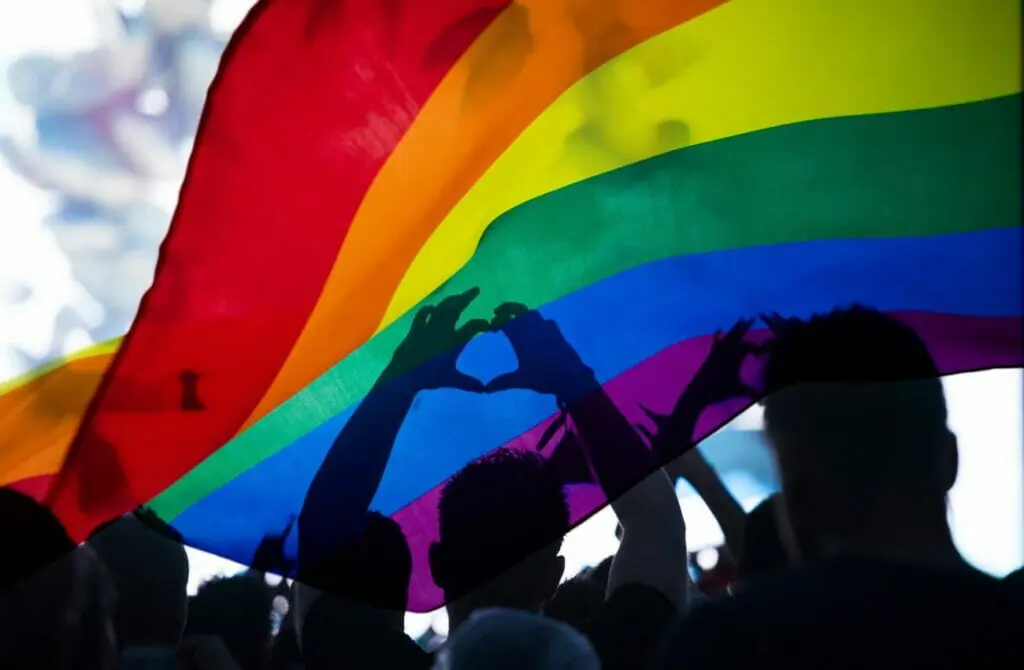

Best Gay Destinations In Bosnia and Herzegovina
Bosnia and Herzegovina, often viewed through the prism of its past conflicts, is slowly emerging as an intriguing destination for the global traveler. For the LGBTQ+ community, Gay Bosnia and Herzegovina offers a nuanced experience, blending its rich cultural heritage with the discreet yet vibrant queer spaces that dot its landscape.
As travelers delve into the ‘best gay destinations in Bosnia and Herzegovina’, they’ll find a country that, while conservative in many aspects, does have pockets where the community has carved out spaces of expression and solace.
In this guide we celebrate each locale for its unique offerings without hierarchies. It’s essential to approach Gay Bosnia and Herzegovina with both curiosity and caution, acknowledging the intricate societal fabric within which these LGBTQ+ safe spots exist. Each city, with its distinct narrative, contributes to the larger story of a nation grappling with change, offering queer travelers both challenges and charms in equal measure.
Sarajevo, the culturally rich capital of Bosnia and Herzegovina, presents an intoxicating mix of the Ottoman past and burgeoning modernity, making it an intriguing spot for any savvy traveler.
However, for LGBTQ+ visitors, this destination requires a nuanced approach; while the city pulsates with history and offers a tantalizing culinary landscape, its gay scene exists more in the shadows than in the spotlight—think coded languages over Pride parades.


